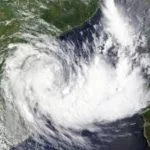
(LONDON) — At least two people have been killed and thousands have been displaced as Tropical Storm Filipo made landfall in Mozambique, the country’s National Institute for Disaster Management said.
The tropical storm made landfall in Mozambique on the March 12 after strengthening off the coast of southeast Africa, bringing strong winds and heavy rain to Mozambique’s Inhambane and Gaza provinces.
At least 2,780 people have been affected by Filipo, which has damaged roads and at least 510 homes, disaster management officials said. At least least 43 families have been displaced, they said.
MIDA estimates over 500,000 people are to be affected by the storm, which arrived a year after Cyclone Freddy, the the devastating storm that killed at least 522 people across Malawi, Mozambique and Madagascar.
“The Mozambique Red Cross is on the ground, working alongside local authorities to assess the situation,” said the International Federation of the Red Cross (IFRC), “All our thoughts and solidarity are with the people impacted by this disaster.”
South Africa’s weather service (SAWS) said the tropical storm is expected to mostly affect southern Mozambique, but its effect “will also be felt over the extreme north-eastern parts of South Africa.”
The International Organization for Migration (IOM) said over 1,000 people from about 200 families have taken shelter across four active accommodation centers in the southern Mozambique city of Inhambane as of March 13.
“Consecutive disasters have made it almost impossible for affected communities to recover and rebuild their lives,” says Oxfam Southern Africa Programme Director Machinda Marongwe. “Whatever little crops people have tried planting in this growing season have been damaged either due to El Nino-induced six weeks of dry spells or by flash floods.”
The World Bank in 2023 mobilized $150 million to Mozambique to help the southern African nation recover from Cyclone Freddy, the tropical cyclone – one of the strongest ever recorded in the southern hemisphere – battering Mozambique twice in late February and early March of 2023.
Agencies say they are continuing to monitor the storm as it passes through Mozambique.
Copyright © 2024, ABC Audio. All rights reserved.
